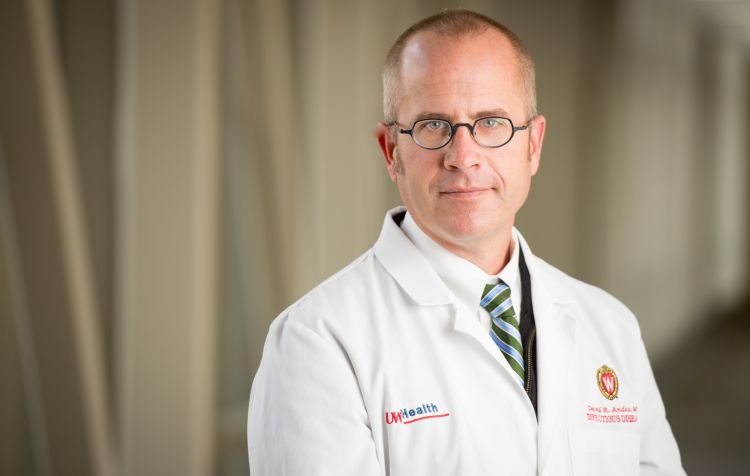Funding awarded to Dr. David Andes for research on medical device biofilms

Medical devices such as central venous catheters, indwelling bladder catheters, joint prostheses, and mechanical heart valves are life-saving, but they also pose a risk. Their surfaces can serve as safe harbor for some microbes. The resulting microbial biofilms are extraordinarily tough and drug-resistant, leading to infections that can be difficult to treat and, sometimes, life-threatening.
A research study on fungal biofilms led by David Andes, MD, professor and head, Infectious Disease, aims to discover new ways to combat medical device biofilms caused by Candida yeast species. The study has been awarded $1.9 M over 5 years (R01 award) from the National Institutes of Health.
By carefully studying how Candida biofilms form, Dr. Andes' group discovered that a key step in the formation of the structure is the yeast species' ability to make a protective carbohydrate substance. This mannan-glucan complex shields the microbe from harm, and prevents antifungal drugs from being effective.
The complex does not form within the yeast cells, but rather is constructed by building blocks that the cells deliver to their immediate exterior. "We were surprised to find the maturation process of this complex occurred in the extracellular space," said Dr. Andes.
The research team has identified how Candida yeast species transport and disperse mannan-glucan complex building blocks through the extracellular matrix, using lipid vesicles to deliver their payload of precursors.
By interfering with this process, researchers hope to prevent biofilms from forming.
"Our major objectives now are to define the vesicle cargo responsible for the matrix drug resistance, to define the vesicle cargo responsible for cell dispersion, and to discern the genetic pathways that orchestrate this novel process during biofilm pathogenesis," said Dr. Andes.
Resources:
- Dominguez E, Zarnowski R, Sanchez H, Covelli AS, Westler WM, Azadi P, Nett J, Mitchell AP, Andes DR. 2018. Conservation and Divergence in the Candida Species Biofilm Matrix Mannan-Glucan Complex Structure, Function, and Genetic Control. mBio. 9(2): e00451-18.
- Desai JV, Mitchell AP, Andes DR. 2014. Fungal Biofilms, Drug Resistance, and Recurrent Infection. Cold Spring Harb Perspect Med.4(10): a019729.